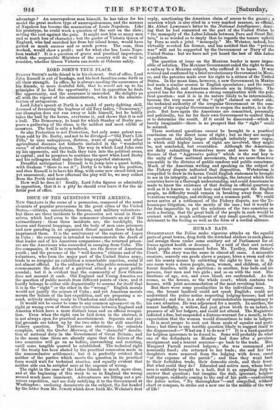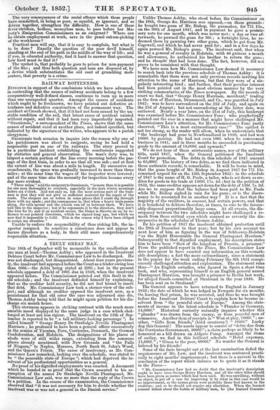HUMAN RATS.
OCCASIONALLY the Police make vigorous attacks on the squalid parts of great towns, drag forth the wretched abiders in such places, and arraign them under some sanitary act of Parliament for of- fences against health or decency. In a raid of that sort several Irish people were summoned before Mr. Yardley, from Slater's Court. The story was the same in almost all cases. A miserable creature, scarcely one grade above a pauper, hires a room and ekes out his scanty means by subletting the right to live in it. In one room were a dozen people, men, women, and children, of dif- ferent families, with no partition; in another, four beds and six persons, four men and two girls ; and so on with the rest. Dis- tinctions of age, sex, and even blood, are confounded. As the rooms, so the houses, so the whole court; which contains ten houses, with joint accommodation of the most revolting kind.
But there were some peculiarities in the individual cases. In one, the tenant landlord could not speak English ; could not understand the police notice respecting lodging-houses; had not registered ; and was in a state of untranslateable incompetency to his own situation. He was adjourned for a month. In another, the tenant landlady, a widow, had just given birth to an infant, in presence of all her lodgers, and could not attend. The Magistrate inflicted a fine, but suspended a distress-warrant for a month, in the expectation that the woman would discontinue to take in lodgers.
It is most proper to rout out these nests of squalor and pesti- lence; but there is one terrible question; likely to suggest itself to the dispossessed—" What am I to do now P" It is a hard question for helpless ignorance to be forced to. Some will probably do what one of the defendants on Monday had done after a previous arraignment and a lenient sentence—go back to the trade. Mrs. Margaret Farrell received lodgers ; she was summoned r and nominally fined; she returned to her trade; she and her two daughters were removed from the lodging with fever, cured " at the expense of the parish" ; and then they went back to their forbidden trade, their domestic circle, and their fever. But what could they do ? Educated and active men, whose busi- ness is suddenly brought to a halt, find it an appalling duty to answer that question; but imagine the dull, ignorant, helpless half-pauper, suddenly coming to the end of his path—confronting the police notice, " No thoroughfare "—and compelled, without chart or compass, to strike out a new one in the middle of the way of life ! The very consequences of the social offence which these people have committed, in being so poor, so squalid, so ignorant, and so driven together, strengthen the difficulty. How is one of these fever:stricken, bedless, moneyless men, to pass before her Ma- jesty's Emigration Commissioners as an emigrant ? Where can he obtain employment at work, save in the penal oakum-picking of the workhouse ?
, Practical men will say, that it is easy to complain, but what is to be done ? Exactly the question of the poor devil himself, standing at the end of his path in the middle of the way of life ; and if you, in educated authonty, find it hard to answer that question, how hard must he find it?
The upshot is, that probably he goes to prison for non-payment of the fine ; and thus both question and man are disposed of, by a device which substantiates the old cant of grumbling mob- orators, that poverty is a crime.



























 Previous page
Previous page